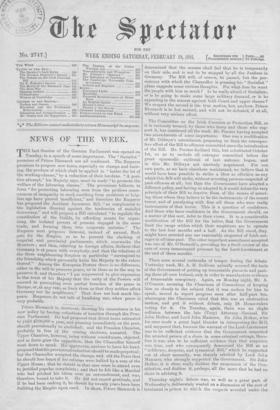Prince Bismarck is, moreover, showing his earnestness in his new
policy by forcing reductions of taxation through the Prus- sian Parliament. He had proposed that direct taxes estimated to yield £700,000 a year, and pressing immediately on the poor, should provisionally be abolished ; and the Prussian Chamber, probably in fear of the coming elections, assented. The Upper Chamber, however, being without constituents, objected, and so fierce grew the opposition, that the Chancellor himself went down to speak. His opponents, anxious to force his hand, proposed that the provisional reduction should be made perpetual ; but the Chancellor accepted the change, and old the Peers that he should lose heart if Ms reforms were balked by a vote of the Upper House ; that he should in that case cease to attend even to justified popular complaints ; and that he felt like a Marshal who had pitched his bilton over an entrenchment, and was, therefore, bound to take it. He did not expect gratitude, and if he had been seeking it, he should for twenty years have been building the Empire upon sand. In short, Prince Bismarck is
determined that the masses shall feel that he is temporarily on their side, and is not to be stopped by all the Junkers in Germany. The Bill will of course, be passed, but the per- sistency with which the Chancellor is pressing his " Socialist " plans suggests some curious thoughts. For What does he want the people with him so much P Is he really afraid of Socialism, or is he going to make some large military demand, or is he appealing to the masses against both Court and upper classes P We suspect the second is the true motive, but, anyhow, Prince Bismarck is in hot earnest, and will not be defeated, if at all, without very serious effort.


































